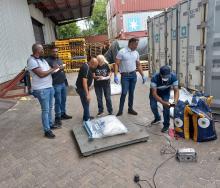Air Menzies International (AMI) has started operating a new cold-chain facility in Johannesburg to coincide with the wholesaler’s accelerated expansion exercise whereby physical handling capacity has been doubled across the board.
At Sky Park Industrial Complex adjacent to OR Tambo International Airport, AMI has already moved into its new warehouse and office complex which, at 2 959 square metres, is more than twice the 1 450 squares that the express freight company used to have at its disposal.
With its new perishables unit at the airport itself, AMI believes it's on the cusp of becoming the preferred cargo handler for temperature-sensitive goods – if it isn’t already.
Inside “Unit 19”, next to AMI’s older “Unit 20” facility, Fred du Plessis, the branch manager for Perishables and Charter Services at AMI, explains that growing demand has necessitated seeking additional space.
However, physical expansion into an existing facility next to Unit 20 also necessitated a complete floor-to-roof overhaul of Unit 19 that includes a new epoxy resin floor, five fan units equipped with best-practice sensor technology to stay on top of temperature control, and a vacuum-forced cooling chamber for temperature correction.
The latter, especially, gives AMI’s cold-chain capability an edge that should translate into quick uptake, Du Plessis says.
“In the event of product reaching us and, for some reason or another there has been a change in temperature during road freight, for example, we can immediately correct cargo cooling according to a client’s specifications.”
Du Plessis says this kind of temperature control includes monitoring from the time a truck arrives at AMI’s cold-chain storeroom, to product processing and airline handover, during which time clients are continually kept abreast of what’s happening with their perishables.
“It’s all about keeping the entire cold storage chain intact, from arrival to dispatch and safe and secure storage in between.”
In keeping with international norms and standards, AMI’s new Unit 19 facility also offers product separation, Du Plessis says, to rule out exposure between one cold-chain consignment that can potentially affect another.
This is especially the case with ethylene, the gaseous plant hormone emitted by certain types of fruit that can quicken the ripening of other perishables.
“That’s why we have a split in this facility, to make sure that products adhere to the best temperature-control techniques in line with the latest global policies and procedures.”
Du Plessis adds that along with the older Unit 20 facility, AMI strikes a very good balance between various goods that must be stored at around two degrees, and more forgiving products that can handle eight degrees.
In addition to a separate five-degree facility used exclusively for flowers, the company feels it offers an all-round service that covers all aspects of cold-chain cargo.
“We’re very excited by what we have accomplished here,” Du Plessis says.
“We have the latest in individually controlled refrigeration technology, real-time monitored by cutting-edge sensors feeding temperature information through to a centralised control system. If anything changes, we can do the necessary temperature stabilisation to ensure top-standard perishables shipping.
“The amount of space we now have also gives us the flexibility to handle express delivery volume offset by longer-term storage capability during low-volume periods. It’s a best-practice best-of-all-worlds approach that guarantees unparalleled cold cargo capability.”













